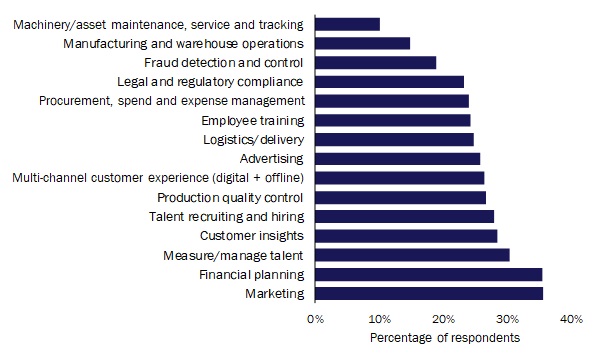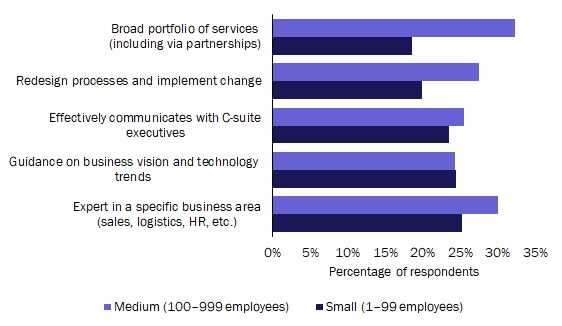Technology channel partners need to work with business experts to address SMB digital transformation

Small and medium-sized businesses (SMBs) are digitalising various business functions and processes as they react to new competitive realities and customer needs. CEOs and line-of-business (LOB) executives are leading the transformation. SMBs are examining where new technology connects with business processes, which is forcing them to re-evaluate the types of partners that are best suited to deliver technology-driven outcomes. Increasingly, SMBs want their partners to provide a mix of business and technology expertise. It is no longer sufficient to offer technology expertise only.
This shift in SMB buying behavior is both an opportunity and a warning signal for channel partners such as value-added resellers (VARs), systems integrators (SIs) and managed service providers (MSPs), as well as the vendor community at large. SMBs can now choose to acquire technology solutions either from business-savvy channel partners (such as a networking and security VAR that will also help to define the customer's data security and compliance policies), or from IT-savvy professional business services consultants (such as a digital marketing agency that will develop a digital strategy, but will also design and deliver a turnkey marketing automation system).
Channel partners should consider partnering with professional services businesses, if they are to win in this environment. Such partnerships will enable channel partners to bring business function-specific consultative knowledge and skills to the technology sales and implementation cycle. CEOs and LOB executives on SMB buying teams will expect this knowledge to be deep and credible.
Vendors will have a big role to play in enabling the success of their channel ecosystems, especially by linking professional business services consultants with channel partners.
Digital transformation is forcing SMBs to seek out business and technology partners with multiple skill sets
We surveyed 3000 businesses worldwide to understand their expectations of channel partners and which capabilities truly mattered to them in their business transformation journeys.
SMBs want to transform a variety of different, and often unconnected, areas of their businesses. For example, more than a third of SMBs are prioritising marketing and financial planning (see Figure 1). For channel partners, this is a challenging set of requirements because it requires them to be experts in a broad set of functions.
Figure 1: Areas targeted for digital transformation and automation by SMBs, worldwide, 2019

Source: Analysys Mason's SMB worldwide technology survey 2019
A significant number of SMBs prefer to work with channel partners that bring thought leadership and functional business expertise. More than a quarter of SMBs rate "Expertise in a specific business area" as a highly desired skill among channel partners (see Figure 2).
SMBs also need guidance on technology trends and business vision from channel partners. Almost 3 in 10 medium-sized businesses need channel partners to help with process redesign and change management.
These needs are more acutely expressed by medium-sized businesses (see Figure 2).
Figure 2: Skills desired of technology service providers by SMBs, worldwide, 2019

Source: Analysys Mason's SMB worldwide technology survey 2019
Channel partners that are unable to offer a proposition that includes professional services (in addition to their core technology expertise) may risk being eliminated early on in the buying cycle by a sizeable (and growing) number of SMBs.
Organically evolving an IT services business to include professional business services is challenging – partnering could be easier
There is no easy way for channel partners to offer a blended technology and professional value proposition quickly and organically, given the worldwide shortage of well-qualified and competent talent, and the internal management challenges involved in expanding their professional services footprint. Instead, channel partners need to establish partnerships with professional business services firms to create the requisite synergies.
Almost one million firms (including channel partners) in the USA offer a range of professional business services, such as:
- legal services
- accounting, tax preparation, bookkeeping and payroll services
- architectural, engineering, and related services
- specialised design services
- computer systems design and related services
- management, scientific, and technical consulting services
- scientific research and development services
- advertising and related services
- other professional, scientific and technical services.
Most of these professional services firms need to add technology to their core value proposition because their customers are becoming more tech-savvy.
The key for IT channel partners is to identify specific value propositions that they can offer in conjunction with specific types of professional services firms and then to explore partnering opportunities such as:
- legal and compliance services + storage and security services
- marketing analytics + compute power and cloud databases
- recruiting and talent management services + HR and AI software solutions
- logistics, warehousing and transportation services + IoT, 5G and networking
- building management services + IoT, video-surveillance and mobile apps.
IT vendors have a pivotal role to play in making such scenarios viable and executable for their partner ecosystems.
IT vendors need to include appropriate professional services firms in their partner-to-partner programmes
Enabling networking within their partner ecosystems is not new for IT vendors, and it is a well-established practice for channel partners to seek out complementary partnerships for specific deals.
Cisco is a leading example of an IT vendor that has accelerated sales by pairing disparate partners. Its Accelerating Cisco Ecosystem Sales (ACES) programme (https://blogs.cisco.com/tag/aces) enables partners to team up and create a singular value proposition, then follow up with sales calls and present 'one face' to the customer throughout the duration of a project.
Microsoft's Partner-to-Partner programme is a good example of a scheme that brings channel partners and business service providers worldwide together to network and resell each other's solutions.
Many channel partners will find it challenging to establish partnerships with professional business services companies, but vendors will need to help to encourage alliances and define pathways that will enable them to work together.
